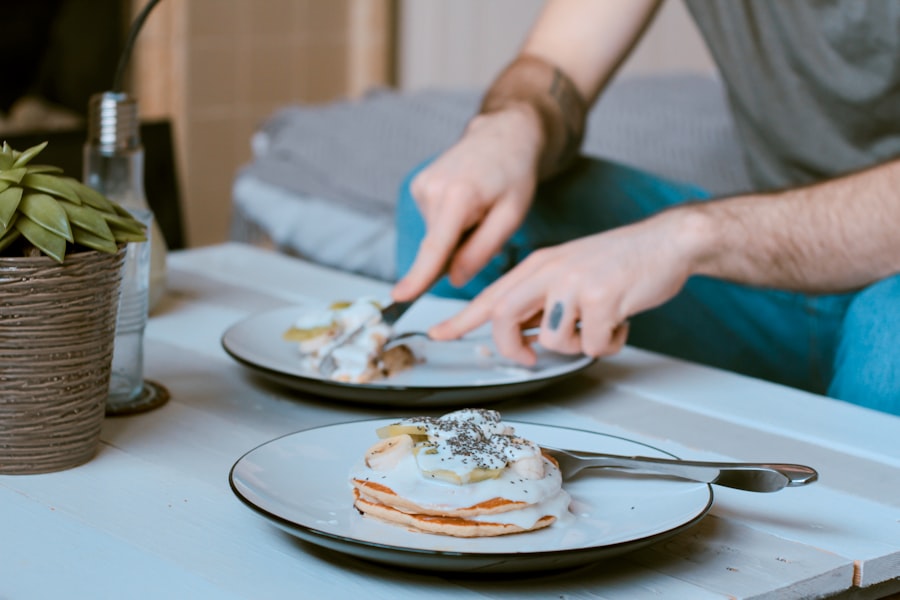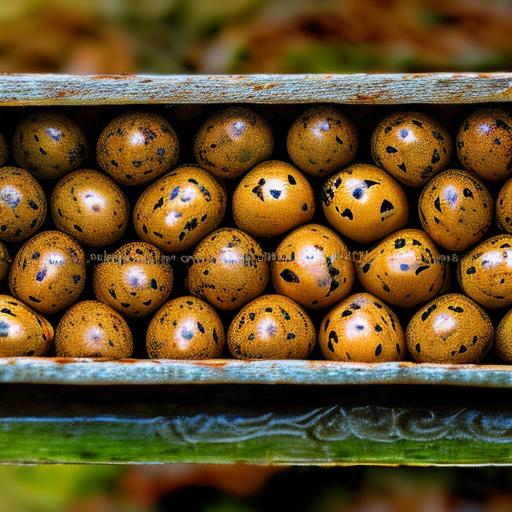Quail eggs are small, speckled eggs that come from the quail bird, a small game bird that is native to Europe, Asia, and Africa. These eggs are considered a delicacy in many parts of the world and are known for their rich, creamy yolk and delicate flavor. Quail eggs are also highly nutritious, containing high levels of protein, vitamins, and minerals. They are often used in gourmet cooking and are a popular ingredient in many Asian and European cuisines.
Quail eggs are smaller than chicken eggs, with a mottled brown shell that is often speckled with dark spots. The eggs are typically about one-third the size of a chicken egg, making them a popular choice for appetizers, garnishes, and decorative purposes. Quail eggs are also known for their beautiful appearance, with a delicate shell that can be a range of colors from pale brown to blue or green. These eggs are often considered a delicacy and are prized for their unique flavor and texture.
Key Takeaways
- Quail eggs are small, nutritious eggs that are gaining popularity in the culinary world.
- Store quail eggs in the refrigerator at a consistent temperature to maintain freshness.
- Quail eggs have a shelf life of about 3-4 weeks when properly stored.
- Handle quail eggs with care to avoid cracking or contamination.
- Signs of spoilage in quail eggs include a foul odor, discoloration, and slimy texture.
- Quail eggs can be used in a variety of recipes, including salads, appetizers, and pickled dishes.
- In conclusion, quail eggs are a versatile and healthy ingredient that can add a unique touch to your culinary creations.
Storage of Quail Eggs
When it comes to storing quail eggs, it’s important to keep in mind that they are more delicate than chicken eggs. Quail eggs should be stored in the refrigerator to maintain their freshness and quality. It’s best to store quail eggs in their original carton or in a covered container to protect them from absorbing strong odors from other foods in the fridge. It’s important to keep quail eggs at a consistent temperature to prevent them from spoiling prematurely.
Quail eggs should be stored with the pointed end facing down to help keep the yolk centered and prevent it from touching the shell, which can help prolong their shelf life. It’s also important to handle quail eggs with care when storing them, as they are more fragile than chicken eggs and can easily crack or break if mishandled. By following these storage guidelines, you can ensure that your quail eggs stay fresh and safe to eat for as long as possible.
Shelf Life of Quail Eggs
The shelf life of quail eggs can vary depending on how they are stored and handled. When properly stored in the refrigerator, quail eggs can last for up to 5-6 weeks. It’s important to keep them at a consistent temperature and avoid any drastic temperature changes, as this can affect their quality and shelf life. It’s also important to check the expiration date on the carton of quail eggs and use them before this date to ensure they are still fresh and safe to eat.
It’s important to note that quail eggs have a shorter shelf life than chicken eggs, so it’s best to use them within a reasonable amount of time after purchasing them. If you’re unsure about the freshness of your quail eggs, you can perform a simple float test by placing the eggs in a bowl of water. Fresh quail eggs will sink to the bottom and lay flat on their sides, while older eggs will stand upright or float. By following these guidelines, you can ensure that your quail eggs are safe to eat and enjoy their delicate flavor and texture.
Proper Handling of Quail Eggs
Proper handling of quail eggs is essential to maintaining their freshness and quality. When handling quail eggs, it’s important to be gentle and avoid any rough handling that can cause them to crack or break. It’s best to use clean hands when handling quail eggs and avoid washing them unless necessary, as this can remove the protective coating on the shell that helps keep out bacteria and contaminants.
It’s also important to store quail eggs in the refrigerator as soon as possible after purchasing them to maintain their freshness. When transporting quail eggs, it’s best to use a cooler or insulated bag to keep them at a consistent temperature and prevent them from spoiling. It’s also important to keep quail eggs away from strong-smelling foods in the fridge, as they can absorb odors easily. By following these handling guidelines, you can ensure that your quail eggs stay fresh and safe to eat for as long as possible.
Signs of Spoilage in Quail Eggs
It’s important to be able to recognize the signs of spoilage in quail eggs to ensure that they are safe to eat. One of the most common signs of spoilage in quail eggs is a foul odor, which can indicate that the eggs have gone bad. It’s also important to check for any cracks or leaks in the shell, as this can allow bacteria to enter the egg and cause it to spoil. If you notice any discoloration or mold on the shell of the quail egg, it’s best to discard it as it may be unsafe to eat.
Another sign of spoilage in quail eggs is if the egg white appears watery or discolored, which can indicate that the egg has started to spoil. It’s also important to check the yolk for any unusual odors or discoloration, as this can also indicate that the egg is no longer fresh. By being able to recognize these signs of spoilage, you can ensure that your quail eggs are safe to eat and enjoy their delicate flavor and texture.
Using Quail Eggs in Recipes

Quail eggs are a versatile ingredient that can be used in a wide variety of recipes, from appetizers and salads to main dishes and desserts. These small eggs are prized for their rich, creamy yolk and delicate flavor, making them a popular choice for gourmet cooking. Quail eggs can be hard-boiled, soft-boiled, fried, or poached and used as a garnish for dishes such as salads, soups, and sushi.
Quail eggs can also be used in baking recipes such as cakes, pastries, and custards, adding a rich flavor and creamy texture to the finished dish. They can also be pickled or marinated for a unique twist on traditional egg dishes. Quail eggs are often used in Asian cuisines such as Japanese, Chinese, and Thai cooking, where they are prized for their delicate flavor and beautiful appearance. By incorporating quail eggs into your cooking repertoire, you can add a touch of elegance and sophistication to your dishes.
Conclusion and Final Thoughts
In conclusion, quail eggs are a unique and versatile ingredient that is prized for its delicate flavor and rich, creamy yolk. These small eggs are highly nutritious and can be used in a wide variety of recipes, from appetizers and salads to main dishes and desserts. When it comes to storing quail eggs, it’s important to keep them in the refrigerator and handle them with care to maintain their freshness and quality.
By being able to recognize the signs of spoilage in quail eggs, you can ensure that they are safe to eat and enjoy their delicate flavor and texture. Whether you’re using quail eggs as a garnish for salads or soups or incorporating them into baking recipes, these small eggs are sure to add a touch of elegance and sophistication to your cooking. So next time you’re looking for a unique ingredient to elevate your dishes, consider adding quail eggs to your culinary repertoire for a truly special touch.
If you’re wondering how long you can keep quail eggs, you might also be interested in learning about the benefits of having your own chicken coop. Check out this informative article on renting a chicken coop to discover how it can provide you with a sustainable source of fresh eggs and the joy of raising your own chickens. Understanding the basics of chicken coops, such as the Producers Pride Sentinel Chicken Coop and exploring large chicken coop ideas, can help you create a comfortable and productive environment for your feathered friends.
FAQs
How long can I keep quail eggs?
Quail eggs can be kept for up to 2 weeks if stored properly in the refrigerator.
How should I store quail eggs?
Quail eggs should be stored in the refrigerator at a temperature of around 45-50°F (7-10°C). It is best to store them in their original carton to help maintain their freshness.
Can I freeze quail eggs?
Yes, quail eggs can be frozen for up to 1 month. It is best to crack the eggs into a container, gently beat them, and then freeze them in an airtight container.
How can I tell if quail eggs are still fresh?
You can perform the float test to check the freshness of quail eggs. Place the eggs in a bowl of water – if they sink and lay flat on the bottom, they are fresh. If they stand upright or float, they are not fresh and should be discarded.
Can I eat quail eggs after the expiration date?
It is not recommended to consume quail eggs after the expiration date as their quality and safety may be compromised. Always check the expiration date before consuming quail eggs.
Meet Walter, the feathered-friend fanatic of Florida! Nestled in the sunshine state, Walter struts through life with his feathered companions, clucking his way to happiness. With a coop that’s fancier than a five-star hotel, he’s the Don Juan of the chicken world. When he’s not teaching his hens to do the cha-cha, you’ll find him in a heated debate with his prized rooster, Sir Clucks-a-Lot. Walter’s poultry passion is no yolk; he’s the sunny-side-up guy you never knew you needed in your flock of friends!







